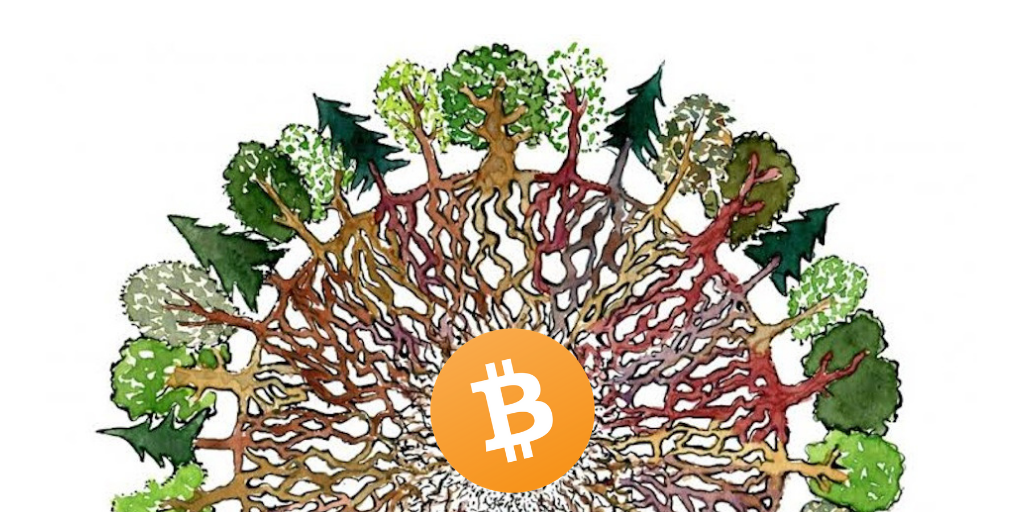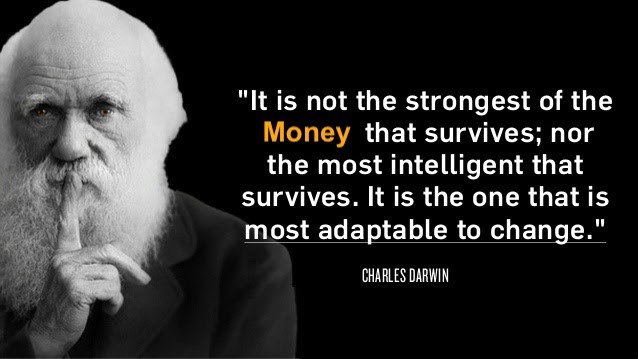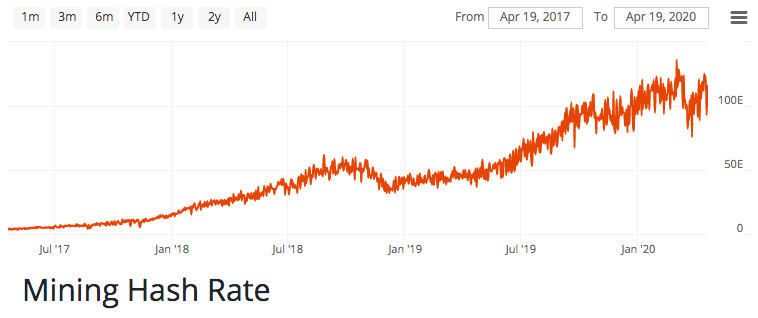Bitcoin is a Catalyst for Human Evolution - Symbiosis — Part 4 of 4
| If you find WORDS helpful, Bitcoin donations are unnecessary but appreciated. Our goal is to spread and preserve Bitcoin writings for future generations. Read more. | Make a Donation |
Bitcoin is a Catalyst for Human Evolution (Symbiosis) — Part 4/4
Exploring Bitcoin through the lens of natural selection, evolution, and symbiosis
By Brandon Quittem
Posted April 24, 2020

This is a story of how symbiotic relationships can change the course of history forever.
Just as fungi and plants formed a symbiotic relationship to successfully colonize dry land, humans can form symbiosis with Bitcoin to improve individually and to advance our species.
In this article we’re going to explore Bitcoin as a catalyst for human evolution, through the lens of geological timescales, evolution, and symbiosis.
Definition of Symbiosis: when two dissimilar organisms live together in intimate association (as in parasitism or mutualism). Example: Clownfish and Sea Anemones
This is part 4 of “The Mycelium of Money,” here’s the whole series for reference.
- Part 1: Bitcoin is a Decentralized Organism (Mycelium)
- Part 2: Bitcoin is a Social Creature (Mushroom)
- Part 3: Bitcoin is the Antivirus to Uncertainty (Medicine)
- Part 4: Bitcoin is a Catalyst for Human Evolution (Symbiosis) → this one
Let’s begin.
Bootstrapping Life on Terra Incognita
Five hundred million years ago, all biological life lived in the oceans. Dry land as we know it was a sterile volcanic wasteland devoid of life. That is, until plants and fungi formed a fateful partnership that changed the course of history forever.
This symbiotic partnership created a cascade of evolutionary forces leading to the creation of all terrestrial life, including homo sapiens.
Fast forward to modernity, humans now organize around network based technologies, such as the internet and Bitcoin, which are reincarnations of the ancient mycelial archetype out of which we emerged.
Take a deep breath. Life is amazing.
Ok, so how did we get here?
First, a quick biology lesson. Organisms are classified as either Autotrophic or Heterotrophic.
Autotrophs are organisms that make their food. For example: plants convert sunlight and carbon dioxide into food via photosynthesis.
Heterotrophs are organisms that find their food. For example: lions eat the gazelles and fungi produce enzymes to externally digest their environment.
Like human settlers, organisms colonizing new territory are most vulnerable in the early days. In order for fungi to colonize dry land (terra), they needed to secure a reliable food source.
Fungi effectively domesticated photosynthesis machines (algae) to harness a self sustaining food source. We can think of these algae as little solar panels bolted onto fungal networks which made colonizing virgin dry land possible.
Soon after getting established, the fungi began digesting the volcanic rock upon which they sat. This ultimately liberated valuable nutrients which were then traded with other nearby fungi, algae, bacteria, etc. Together, these early settlers bootstrapped life on dry land. Let’s see how this compares to Bitcoin.
How Satoshi bootstrapped embryonic Bitcoin
In order to colonize the internet (terra incognita) with a new form of money, Satoshi needed to form a symbiotic partnership.
Fortunately, he found the perfect partnership and made a series of wise decisions that maximized Bitcoin’s chance of survival during the bootstrapping phase.
How satoshi “partnered with the algae” to bootstrap Bitcoin’s life on the internet
- High early issuance rate disproportionately rewarded early adopters (the early issuance rate might have been _too _aggressive)
- Launched on the Cryptography mailing list (if anyone could incubate Bitcoin it was the Cypherpunks on that email list)
- Timing the launch during the 08/09 financial crisis (was this blind luck?)
- Satoshi’s message in the genesis block “Chancellor on the second brink of bailout” (rallying cry to gain ideologically motivated supporters)
Mutualism or Parasitism: Examining the Cypherpunk-Satoshi-Symbiosis
Were the algae complicit in the fungal partnership (mutualism)? Or were the fungi taking advantage of the algae’s ability to make food at the expense of the algae (parasitism)?
It appears to be mutualism. The algae may have been initially kidnapped, however in exchange for photosynthesizing, they gained a mycelial security system, and the opportunity to colonize a new niche.
Were the cypherpunks complicit and did they benefit in the partnership (mutualism)? Or did satoshi take advantage of the cyberpunks because he needed an initial distribution strategy (parasitism)?
“It’s very attractive to the libertarian viewpoint if we can explain it properly. I’m better with code than with words though.” — Satoshi Nakamoto
Most cypherpunks dismissed Bitcoin initially, however a select few (most notably: Hal Finney) jumped onboard. Considering they were first to learn about Bitcoin, they had a chance to acquire Bitcoin’s native monetary units in exchange for the marginal electricity cost to mine (essentially nothing). With the advantage of hindsight, acquiring Bitcoin during the first few years would lead to wealth beyond measure.
“The possibility of generating coins today with a few cents of compute time may be a good bet, a payoff of something like 100 million to 1!” — Hal Finney
(Economic) Evolution by Natural Selection

With the initial conditions of life on land set into motion, the fungal-plant alliance can start welcoming new market participants (organisms) to enter the ecosystem.
Fungi interact with the world through chemistry. They secrete enzymes to externally digest their environment. Volcanic rock was the only restaurant in town. These early fungi liberated molecular resources by metabolizing the volcanic rock upon which they stood.
This enabled a proto-economy made up of primitive fungi, plants, and bacteria. They traded essential molecules required for carbon based lifeforms (carbon, nitrogen, oxygen, etc).
Fungi were essentially turning rocks into fungible biology tokens. These biology tokens were then traded on top of mycelial rails connecting all nearby life. Fungi both created the market and facilitated trade leading to an explosion of biodiversity on dry land.
Terra takes her first breath
Before plants colonized dry land, our earth’s atmosphere wasn’t very hospitable. As you know, plants inhale CO2 and exhale O2. This ultimately led to the formation of our oxygen rich atmosphere — planet earth was taking her first breath.
In a sense, fungi unleashed free market dynamics in a new market which led to an incredible proliferation of life. Now let’s explore the parallels with Bitcoin.
Bitcoin enables a new economic paradigm
Just as novel organisms emerge (via speciation) to occupy newly created niches on dry land, Bitcoin evolves it’s DNA (code) to produce new phenotypes (novel features) to take advantage of new niches.
In other words, Bitcoin enables novel financial use cases that were not possible before. This increases the size of the economic pie, thus generating wealth for society.
Novelty provided by Bitcoin:
- The first and only implementation of absolute scarcity (hard to overstate)
- A global, near instant, apolitical, settlement system
- Neutral money not easily captured by special interests.
- Uncensorable medium of exchange for black/grey markets
- Democratization of basic financial services
- Non-sovereign store of value with negligible barrier to entry
Bitcoin and mycelium improve trade
Mycelial networks act as a resource transport layer and communications network connecting organisms in the biosphere. This enables organisms to voluntarily trade resources and knowledge across species lines. Increasing trade leads to increased specialization (division of labor), further increasing biodiversity (wealth and resilience) in the ecosystem.
Currently, our governments form economic monopolies which prevent many citizens from accessing the global markets.
Think about all the unproductive human capital siloed in countries like Iran, Venezuela, and Argentina. Without access to a common economic language (Bitcoin) many people are unable to participate in global trade.
As Bitcoin becomes ubiquitous, it unleashes human productivity leading to increased innovation, specialization, and trade. We’re already seeing some basic examples such as freelancers in Venezuela using Bitcoin as a bridge currency to access USD which effectively evades financial controls.
We can extrapolate “Bitcoin being used as a bridge currency” into a grander vision of the future where everyone speaks the same economic language. A global market for talent leads to more goods and services produced for a cheaper price. Not to mention, increased trade with developing countries will help lift people out of poverty.
Bitcoin enables economic evolution by natural selection
Darwinian evolution by natural selection is a biological engine designed to reward successful actors and eliminate unsuccessful actors. When the antelope gets eaten by the lion, it dies, no one bails out the antelope. Nature has skin in the game. This feedback loop is crucial. Individuals are fragile in order to ensure the system is antifragile.
Market based economics is an engine designed to seek more efficient uses of capital by rewarding successful ventures and punishing the unsuccessful. However, our current form of “capitalism” is more like cronyism or as Travis Kling said: “socialism for the rich.”
Instead of letting companies fail, we bail them out. This results in broken incentives which create a moral hazard making the entire system more fragile. Not to mention, disproportionately hurting the working class. Heads I win, tails you lose.
A sound money system (like Bitcoin) improves this economic engine by tightening the feedback mechanism that rewards value creation and punishes failure. In a Bitcoin world, bailouts aren’t really possible because monetary expansion is restrained by a fixed monetary base. Bitcoin ensures individual people/companies are fragile in order to ensure the economic system remains antifragile.
In other words, Bitcoin increases economic “skin in the game” which improves the feedback loop leading to economic evolution by natural selection. Economic Darwinism for the win.
Taming of the Tenrec

Due to a symbiotic relationship with fungi and plants, and evolution by natural selection, our pale blue dot was transformed from a barren rock to the garden of eden. Truly marvelous.
Let’s zoom in to the tail-end of the Cretaceous period (~65 million years ago). The planet was dominated by dinosaurs both on land and in our oceans. Mammals were hardly relevant. Narrator: but things were about to change.
A giant meteor crashed into present day Mexico ending the dinosaurs and most life on planet earth. The impact caused a short term spike in surface temperatures followed by an extended cooling due to debris blocking out sunlight.
Although most organisms were culled during the cataclysm, some species thrived during the chaos. Most notable for our story are Fungi (of course) and a small shrew-like mammal known as the Tenrec (surprising).
Without sunlight, most plants quickly perished. However, the Fungi thrived because they don’t rely on sunlight (remember they find their own food). Fungi were happily decomposing all the newly deceased organisms.
What about the Tenrec?
As temperatures declined and food became scarce, most animals who survived the initial shock were killed by fungal pathogens or eventually starved to death as the global food chain seized up. However, not the Tenrec.
Tenrecs are humble shrew like mammals that lived underground which protected them from hostile conditions on the surface. Their favorite foods (insects and aquatic plants) were relatively unaffected.
Tenrecs are capable of hibernating for up to 9 months at a time. This protects them from short term volatility and enables them to outlast their competition. The best offense is a good defense.
Bitcoin reminds me of the tenrec, both live underground and thrive on volatility. Like the tenrec, Bitcoin simply needs to outlast it’s competition.
“If you wait by the river long enough, the bodies of your enemies will float by.” — Sun Tzu
Give thanks to the tenrec
Turns out, the tenrec is the common ancestor to all living placental mammals. In other words, the only reason both you and I are alive today is because the tiny tenrec survived the dinosaur-ending apocalypse 65 million years ago.
Standing on the Shoulders of Mycelium
Although mammals got off to a slow start, we’ve really come into our own over the last million years. One particular great ape, the homo sapien, achieved global dominance in a relatively short timespan.
Current evidence suggests Humans have only been around for about ~500k years, making us a relatively young species. For comparison, modern elephants have been around for ~5m years.
Like our fungal forefathers, humans have formed symbiotic relationships with our environment throughout history. In fact, we owe our lives to the networked based organisms we call fungi.
Humans begin to settle down
One especially relevant fungal organism is Saccharomyces cerevisiae, otherwise known as brewers yeast.
Human agriculture appears to have begun around 11,500 years ago (although it might be much older). Interestingly, the first crops we cultivated were also the best grains for brewing beer. This begs the question: did we settle down for food/stability or to brew more beer?
Turns out fermented drinks (beer, wine, etc) provided a safe way to stay hydrated as water often contained pathogens that killed ancient man.
Although we didn’t know it at the time, humans formed symbiotic relationships with fungi in order to produce healthy drinking options that saved many lives.
Unbeknownst to most moderns, we still heavily rely on our fungal allies today. Without fungi, say goodbye to all beer, wine, chocolate, bread, and many medicines such as penicillin.
Like ancient man partnered with fungi to survive, us moderns have a similar opportunity to partner with Bitcoin…
Achieving Symbiosis with Bitcoin
We’ve established how both fungi and Bitcoin symbiotically partner with other organisms to bootstrap life and build antifragile ecosystems. Now let’s finish up by exploring how humans can partner with Bitcoin to improve individually and to advance our species.
“The real problem of humanity is the following: we have Paleolithic emotions; medieval institutions; and god-like technology.” — E.O. Wilson
Money is the most important coordination mechanism for society and our existing fiat system is driving our species off a cliff. Instead of arguing red vs blue, it’s time we address the root cause of our societal malaise. It’s time to unfuck the money.
Fiat money has appeared periodically throughout history, however, it’s the exception not the rule. Throughout most of history, humans coordinated around a free market for money. Gold and silver, mainly. Time to wake up from our fiat money coma.
Bitcoin is an Extended Phenotype for humanity
Extended Phenotypes are behaviors that extend an organism’s natural capabilities. Beaver dams are a good example. Bitcoin is an Extended Phenotype for humanity — it lowers the trust required for a global society to communicate value, which enables more sophisticated cooperation.
This offers a unique opportunity to re-architect society based on the separation of money and state aka “natural money.” A huge win for humanity. As such, it’s our duty to form symbiosis with such a force.
Take another deep breath as we’re fortunate to be alive during such an inflection point.
It all starts with individuals forming symbiosis with Bitcoin
Bitcoin was the best performing asset of the last decade. This created unimaginable wealth for early adopters. Besides financial gain, individuals also can benefit from bitcoin in other ways. Interestingly, the values imbued into bitcoin seem to rub off on its adherents.
As a deflationary asset, Bitcoin teaches us to delay consumption today in order to reap greater benefits tomorrow (low time preference).
In a world fulfilled with uncertainty, Bitcoin provides something to be optimistic about. Rather than change the system from the inside, we can put our energy towards a parallel system.
Bitcoin forces us to take personal responsibility for our wealth, both a blessing and a curse. In a world that doesn’t value personal responsibility, Bitcoin serves as a wakeup call.
Partnering with Bitcoin is good for the individual but is it good for mankind?
Cryptography is fundamentally about defense
Bitcoin is the largest implementation of public key cryptography the world has ever seen. A world with strong cryptography shifts the balance of power towards defense. Defense from tyranny, censorship, overarching governments, and surveillance capitalism.
Cryptography allows us to assert our natural rights. Bitcoin protects free speech, ensuring we can “vote with our money.” Free speech is the foundation of open societies. Forming symbiosis with Bitcoin preserves freedoms for our future generations. A cause worth fighting for.
Bitcoin metabolizes fiat infrastructure
We can use fungi to clean up oil spills, halt erosion, create natural pesticides, and even decompose nuclear waste at Chernobyl. In a similar manner, Bitcoin can be used to clean up our dilapidated fiat infrastructure.
Fungi Fact #1: Fungi have already solved many of our problems, yet we barely understand them. Mycoremediation is a promising new field that leverages our understanding of mycology to improve our environment, essentially “applied mycology.”
We’re experiencing a period of unprecedented monetary expansion. Bitcoin as a fixed supply monetary good serves as a counter force to unfettered money printing. Short term, individuals using Bitcoin to avoid capital controls and hedge against local currency risk. Long term, Bitcoin may force conservatism onto central banks, starting with developing nations.
In the richest country in the world (America), average people work for 40 years and never get ahead. The legacy system was designed to siphon wealth from the bottom to the top, most notably during each financial crisis. Since time is money, this forced wealth transfer system should be considered systemic time theft. Make no mistake about it, we should be radicalized by this.
Every time you buy Bitcoin you’re selling dollars. It’s time to join the peaceful revolution. Occupy UTXOs.
Opportunity cost of delaying Bitcoin
Think of all the waste created from a fiat system. Bank bailouts, never ending wars, and capital misallocation are greatly reduced (if not eliminated) under a hard money system.
Each year we delay, we incur increasing opportunity costs. Instead of destroying wealth unnecessarily, how can we invest precious capital into worthy causes?
“We were promised flying cars and all we got was 140 characters” — Peter Thiel
What about colonizing mars? Or reducing the risk of civilization “enders” such as pandemics or nuclear war? How about dyson spheres? Asteroid mining? Or eliminating infectious disease and infant mortality for good?
Let’s embrace the Bitcoin renaissance.
Bitcoin wears risk on its sleeve
Rather than persist in an opaque financial system designed to enrich the few at the expense of the many, let’s embrace a more transparent financial system. A system where risks are laid bare for all to see, rather than buried under bureaucracy and deception.
Fiat money is an inorganic system similar to a monocrop industrial farm. Centrally planned, susceptible to disease, unsustainable, and fragile. Fiat offers short term price stability, at the expense of long term systemic risk. In other words, we don’t account for the “fat tail risks” such as banks blowing up or global pandemics. Both examples lead to wealth transfer furthering wealth gaps.
Bitcoin, on the other hand, is an organic system similar to an old growth rainforest. Fierce competition, incremental growth, sustainable, and antifragile. Bitcoin accepts short term price volatility in exchange for long term systemic stability.
Bitcoin enables an antifragile monetary system, a huge win for humanity.
Bitcoin promotes energy independence
Bitcoin has an insatiable demand for low cost energy. Miners scour the earth for cheap energy assets, acting as the energy buyer of last resort. This incentives innovation in low cost energy production such as excess natural gas and stranded hydroelectric.
Hash rate has been steadily rising, even when price is not. Bitcoin miners are inherently long BTC. What do the miner’s know that you don’t? Rather than putting our heads in the sand, it’s time to form a partnership with reality.

Let’s assume Bitcoin continues it’s monetization path. Eventually, Bitcoin mining becomes a matter of national security. Those countries who produce their own energy (and mine Bitcoin) will have further geo-political advantage over countries reliant on importing energy.
Fungi Fact #2: fossil fuels (hydrocarbons) carry the energy of ancient sunlight originally captured by plants through photosynthesis. Interestingly, earth’s entire supply of coal was formed during the “carboniferous” period which ended ~300m years ago when fungi learned how to digest lignin. Lignin is the polymer that gives plants their rigid structure AND it’s a prerequisite to forming coal. Coal is simply plant material that was “half-digested” by primitive fungi. Modern fungi digest lignin which prevents new coal from being produced.
This creates another incentive for nations to secure local energy sources — whether from fossil fuels, nuclear plants, renewables, or otherwise. Long term, a world with more localized energy production is a more robust world. Like fungi, Bitcoin is an invisible membrane improving the health of the ecosystem it occupies.
Humanity will coalesce on neutral money
The current geo-political game rewards those who exert influence over money production. This means large powerful states, politicized money, and special interests groups competing for influence.
“Give me control of a nation’s money and I care not who makes the laws.” — Mayer Amschel Rothschild
Instead, Bitcoin is a neutral money. A system designed to prevent special interests from exerting undue influence over the money. This creates a more fair game.
Why would any government give up control of their printing press?
In a post-dollar regime, nation-states won’t agree on a new reserve currency. Logically, each state prefers to settle debts in their own currency. We’re already seeing cracks in the dollar hegemony coming out of places like China, Russia, and Iran. Bitcoin is well suited for this problem.
Bitcoin is fully auditable, hard capped, and offers final settlement quickly. The perfect neutral money for untrusting nation-states to settle debts. Under this light, Bitcoin is money for enemies.
It’s time to upgrade humanity by forming symbiosis with Bitcoin.
Let’s Wrap Up
The story of life on earth can be summed up as: success comes to those who form symbiotic relationships with network based organisms (particularly fungi).
As humble apes, it’s our duty to form a symbiotic relationship with Bitcoin. We must strive to understand this phenomenon so that we may shepherd her through adolescence.
Just like fungi colonizing dry land was the catalyst for biological evolution on terra, Bitcoin is a catalyst for human evolution.
Let’s embrace Bitcoin or suffer the fate of the dinosaurs.
Thank you, Brandon
Let’s Connect: Follow me here on medium, check out BrandonQuittem.com, and come say hi on twitter.
P.S. Who’s driving the ship?
Fungi enabled complex life on earth, which eventually gave way to humans. Now humans are creating the internet (and Bitcoin) which both embody the same mycelial archetype of which we came.
We didn’t consciously choose to mimic mycelial networks in these designs. However, animals did taxonomically branch off from fungi millions of years ago. Humans came full circle, the student became the teacher.
Was this inevitable?
The mycelial archetype appears to be embedded into our species. Over time, network based structures continually appear whether due to embedded wisdom or blind luck. These Mycelial inspired network technologies, once discovered, seem to persist due to their antifragile nature.
Many people claim we “discovered Bitcoin.” I’m sympathetic to this idea, however it’s more accurate to say we _re_discovered Bitcoin. The mycelial archetype is an emergent property of biology which means Bitcoin was inevitable.
Acknowledgements
- Thanks to Gigi, Robert Breedlove, and Nic Carter for providing thoughtful notes during the editing process
- Thanks to the mycological community for inspiring my fascination with fungi (the bitcoin community welcomes you)